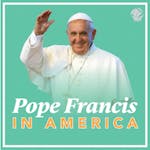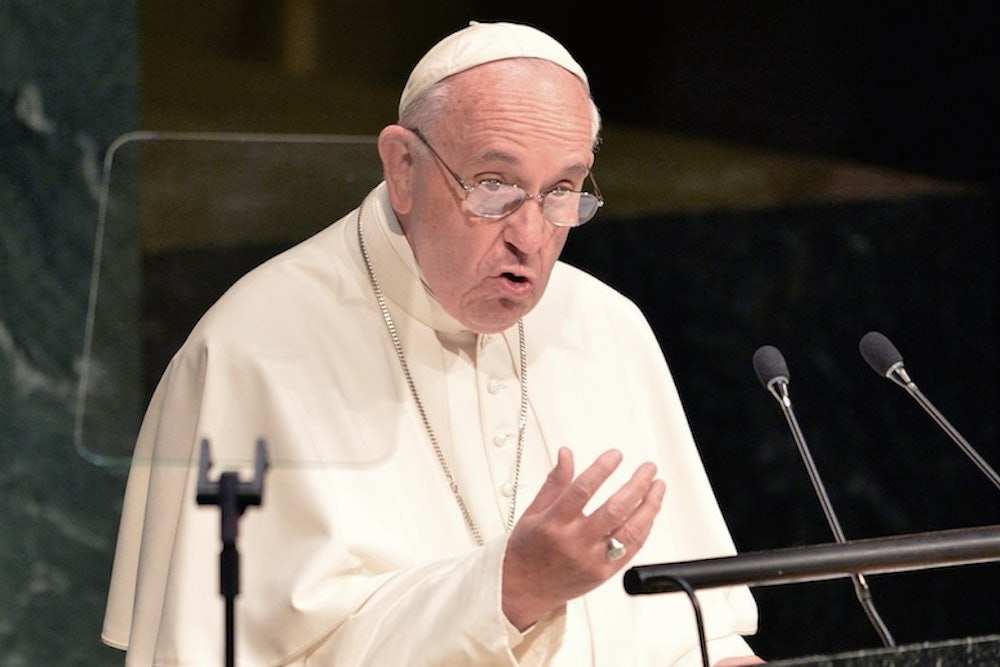
Pope Francis continued his tour of the U.S. with an address to the United Nations General Assembly—the largest gathering of world leaders ever at the U.N.—on Friday morning.
Here are the the highlights from the speech, with insights from New Republic writers and editors on our live blog.
He Called for Reform of the U.N.
Early in his speech, Francis name-checked Dag Hammarskjöld, a former Secretary-General of the U.N. and Nobel Peace Prize winner who worked on the Marshall Plan and the Suez Canal crisis, and "the many United Nations officials at every level who have been killed in the course of humanitarian missions, and missions of peace and reconciliation." But he cautioned that internal bureacracy and power imbalance could corrupt progress:
The experience of the past seventy years has made it clear that reform and adaptation to the times is always necessary in the pursuit of the ultimate goal of granting all countries, without exception, a share in, and a genuine and equitable influence on, decision-making processes. The need for greater equity is especially true in the case of those bodies with effective executive capability, such as the Security Council, the Financial Agencies and the groups or mechanisms specifically created to deal with economic crises. This will help limit every kind of abuse or usury, especially where developing countries are concerned.
Reform is firmly on the agenda for the U.N. General Assembly. The Brazilian President Dilma Rousseff is expected to call for it in her opening speech on Monday, and earlier this week U.S. ambassadors to the U.N. complained that Russia's veto in the security council was blocking action in Syria and Ukraine.
He Warned of the Risks of Environmental Destruction
As expected, Francis spoke about his hopes for the upcoming Paris Conference and emphasized that the fight against environmental destruction is really a fight for equality:
We human beings are part of the environment. We live in communion with it, since the environment itself entails ethical limits which human activity must acknowledge and respect. ... Any harm done to the environment, therefore, is harm done to humanity. ... The misuse and destruction of the environment are also accompanied by a relentless process of exclusion. In effect, a selfish and boundless thirst for power and material prosperity leads both to the misuse of available natural resources and to the exclusion of the weak and disadvantaged.
Elizabeth Bruenig wrote in our liveblog that "Pope Francis doesn’t see climate change as something that can be addressed by a single nation or even a handful of well-meaning nations–he has been emphatic that a plurality of the world’s countries must work together to end and reverse environmental damage."
He Called for the Eradication of Poverty
Much of Francis's speech boils down to one point: it is the duty of politicians to make the world a better place, and the way to make the world a better place is to eliminate the systems the perpetuate poverty. This means improving access to education and other forms of charitable assistance:
To enable these real men and women to escape from extreme poverty, we must allow them to be dignified agents of their own destiny. Integral human development and the full exercise of human dignity cannot be imposed. ...This presupposes and requires the right to education–also for girls (excluded in certain places)–which is ensured first and foremost by respecting and reinforcing the primary right of the family to educate its children.
Francis's focus on poverty is also at the root of his environmental philosophy. "What's remarkable about Pope Francis' emphasis here is that it underscores the importance not only of charity as we commonly think of it–that is, giving what you have left over–but of justice, that is, equitably distributing each their due to begin with" Bruenig noted. "The poor should not be destined to live off the discarded scraps of others, and part of making sure that there is enough to be equitably distributed is making sure that the environment is well-protected enough to produce resources sustainably for a long while to come."
He Celebrated the Iran Deal
Although Francis didn't call it out by name, he announced his support for the global powers' nuclear deal with Iran:
There is urgent need to work for a world free of nuclear weapons, in full application of the non-proliferation Treaty, in letter and spirit, with the goal of a complete prohibition of these weapons. The recent agreement reached on the nuclear question in a sensitive region of Asia and the Middle East is proof of the potential of political good will and of law, exercised with sincerity, patience and constancy. I express my hope that this agreement will be lasting and efficacious, and bring forth the desired fruits with the cooperation of all the parties involved.
"Nuclear arms are an affront to human dignity, because they threaten the good of humankind at large," wrote Bruenig.
Francis always circles back to the protection of humanity, and of the most vulnerable segments of humanity.
He Called for the End of the Drug Trade and Human Trafficking
Francis did not rest as just calling out nuclear weapons and war at large, he also focused on the specific violence that has followed from the narcotics trade:
I would mention another kind of conflict which is not always so open, yet is silently killing millions of people. Another kind of war experienced by many of our societies as a result of the narcotics trade. A war which is taken for granted and poorly fought. Drug trafficking is by its very nature accompanied by trafficking in persons, money laundering, the arms trade, child exploitation and other forms of corruption. A corruption which has penetrated to different levels of social, political, military, artistic and religious life, and, in many cases, has given rise to a parallel structure which threatens the credibility of our institutions.
"According to the International Institute for Strategic Studies, a conflict monitoring center, drug violence in Mexico and Central America can fairly be classified as the third and fourth most deadly wars in the world, respectively, behind only those in Syria and Iraq," said Steven David Cohen. "In 2014, the United Nations called on the United States to treat Central American migrants as refugees."
